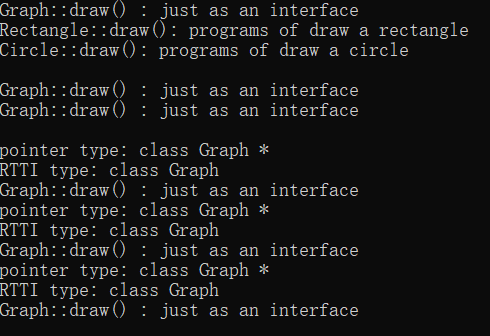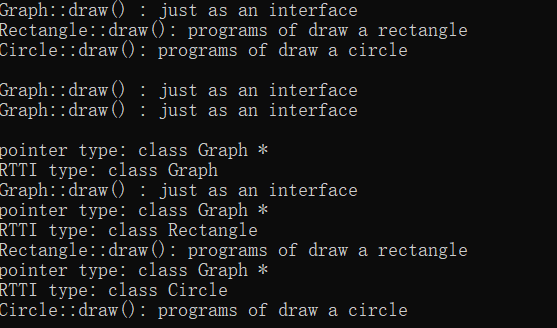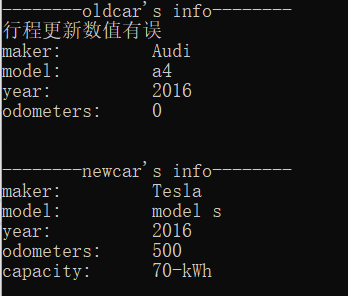实验4 继承
task2.cpp
#include <iostream> #include <typeinfo> // definitation of Graph class Graph { public: void draw() { std::cout << "Graph::draw() : just as an interface\n"; } }; // definition of Rectangle, derived from Graph class Rectangle : public Graph { public: void draw() { std::cout << "Rectangle::draw(): programs of draw a rectangle\n"; } }; // definition of Circle, derived from Graph class Circle : public Graph { public: void draw() { std::cout << "Circle::draw(): programs of draw a circle\n"; } }; // definitaion of fun(): as a call interface void fun(Graph *ptr) { std::cout << "pointer type: " << typeid(ptr).name() << "\n"; std::cout << "RTTI type: " << typeid(*ptr).name() << "\n"; ptr -> draw(); } // test int main() { Graph g1; Rectangle r1; Circle c1; // call by object name g1.draw(); r1.draw(); c1.draw(); std::cout << "\n"; // call by object name, and using the scope resolution operator:: r1.Graph::draw(); c1.Graph::draw(); std::cout << "\n"; // call by pointer to Base class fun(&g1); fun(&r1); fun(&c1); }

改task2.cpp
#include <iostream> #include <typeinfo> // definitation of Graph class Graph { public: virtual void draw() { std::cout << "Graph::draw() : just as an interface\n"; } }; // definition of Rectangle, derived from Graph class Rectangle : public Graph { public: void draw() { std::cout << "Rectangle::draw(): programs of draw a rectangle\n"; } }; // definition of Circle, derived from Graph class Circle : public Graph { public: void draw() { std::cout << "Circle::draw(): programs of draw a circle\n"; } }; // definitaion of fun(): as a call interface void fun(Graph *ptr) { std::cout << "pointer type: " << typeid(ptr).name() << "\n"; std::cout << "RTTI type: " << typeid(*ptr).name() << "\n"; ptr -> draw(); } // test int main() { Graph g1; Rectangle r1; Circle c1; // call by object name g1.draw(); r1.draw(); c1.draw(); std::cout << "\n"; // call by object name, and using the scope resolution operator:: r1.Graph::draw(); c1.Graph::draw(); std::cout << "\n"; // call by pointer to Base class fun(&g1); fun(&r1); fun(&c1); }

同名覆盖原则:派生类与基类中有相同成员时,若未强行指名,则通过派生类对象使用的是派生类的同名成员。
二元作用域分辨符:类名::成员的形式使用,,目的是为了访问基类中的同名函数。
类型兼容原则:指在需要基类对象的任何地方,都可以使用公有派生类的对象来替代。
battert.hpp
#ifndef BATTERY_H #define BATTERY_H #include <iostream> using namespace std; class Battery { private: int capacity; public: Battery(int capacity_0 = 70) :capacity(capacity_0) { } int get_capacity() { return capacity; } }; #endif
car.hpp
#ifndef CAR_H #define CAR_H #include <iostream> #include <string> using namespace std; class Car { private: string maker; string model; int year; int odometers; public: Car(string maker_0, string model_0, int year_0) :maker(maker_0), model(model_0), year(year_0) { odometers = 0; } void info() { cout << "maker: " << maker << endl; cout << "model: " << model << endl; cout << "year: " << year << endl; cout << "odometers: " << odometers << endl; } void update_odometers(int New_o) { if (New_o >= odometers) odometers = New_o; else cout << "行程更新数值有误" << endl; } }; #endif
electricCar.hpp
#ifndef ELECTRICCAR_H #define ELECTRICCAR_H #include <iostream> #include <string> #include "battery.hpp" #include "car.hpp" using namespace std; class ElectricCar :public Car { private: Battery battery; public: ElectricCar(string maker_0, string model_0, int year_0, int capacity_0 = 70) : Car(maker_0, model_0, year_0), battery(capacity_0) { } void info() { this->Car::info(); cout << "capacity: " << battery.get_capacity() << "-kWh" << endl; } }; #endif
task3.cpp
#include <iostream> #include "electricCar.hpp" int main() { using namespace std; // test class of Car Car oldcar("Audi", "a4", 2016); cout << "--------oldcar's info--------" << endl; oldcar.update_odometers(-1); oldcar.info(); cout << endl; // test class of ElectricCar ElectricCar newcar("Tesla", "model s", 2016); newcar.update_odometers(500); cout << "\n--------newcar's info--------\n"; newcar.info(); }

pets.hpp
#ifndef PETS_H #define PETS_H #include <iostream> #include <string> using std::cout; using std::string; using std::endl; class MachinePets { private: string nickname; public: MachinePets(const string name_0) :nickname(name_0) { } string get_nickname()const { return nickname; } virtual string talk() { return "hong hong~"; } }; class PetCats : public MachinePets { public: PetCats(const string s) : MachinePets(s) { } string talk() { return "miao wu~"; } }; class PetDogs : public MachinePets { public: PetDogs(const string s) : MachinePets(s) { } string talk() { return "wang wang~"; } }; #endif
task4.cpp
#include <iostream> #include "pets.hpp" void play(MachinePets* ptr) { std::cout << ptr->get_nickname() << " says " << ptr->talk() << std::endl; } int main() { PetCats cat("miku"); PetDogs dog("da huang"); play(&cat); play(&dog); }




 浙公网安备 33010602011771号
浙公网安备 33010602011771号